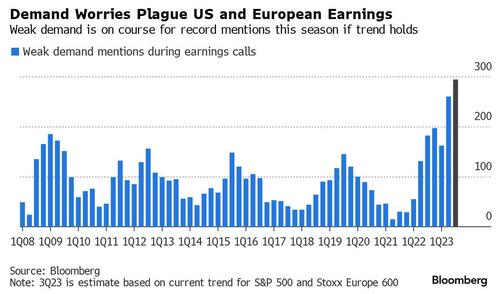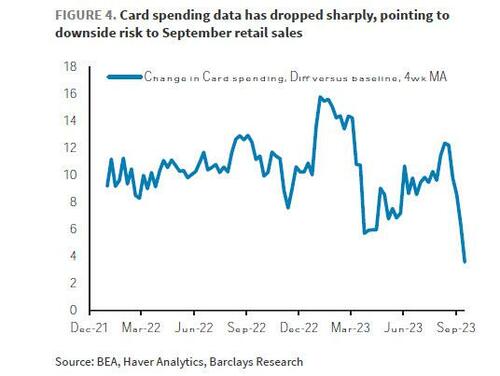Following the warning from ex-Walmart CEO Bill Simon regarding the American consumer nearing a 'breaking point,' Target's CEO, Brian Cornell, has also signaled a cutback in consumer spending, groceries included. This trend aligns with our view, as well as views from JPMorgan and Goldman, that consumers have hit a wall.
On Thursday morning, Cornell spoke with CNBC's Becky Quick on 'Squawk Box' about the retailer's challenges, including the cash crunch facing consumers amid high inflation. He provides a unique insight into consumer behavior patterns at stores nationwide:
"They're managing that budget really carefully, and it certainly is pressuring discretionary spending," Cornell said.
The exec continued: "They're purchasing fewer items, even within the food and beverage sector. When we examine overall retail spending and observe the top line, it appears there's a really healthy consumer out there spending money. But, even in the food and beverage categories, over the last few quarters, we've seen a decline in the units, the number of items they're buying."
"So, they're even tightening up their spending in those categories. In discretionary goods, we have seen seven consecutive quarters of decline in both dollars and units. This means consumers are buying less apparel, fewer items for their home, and fewer toys," he said.
CNBC's Quick than asked:
"We see areas in our economy where things look great. The GDP rebounded by 4.9% for the third quarter. But what you're describing sounds like a recession in certain areas of the economy."
Cornell responded:
"I think that's a really fair assessment. It underscores why it's so crucial not to just look at the top line but to delve deeper and examine what's happening in different categories. We need to consider the impact of the last three or four years of rising costs on how Americans are budgeting each week and understand what they are trading off.
"For seven quarters, they've been purchasing fewer discretionary items, and they're not buying the goods they were during the pandemic. Now, that will change over time, and we're certainly planning conservatively in those categories."
Besides touching on out-of-control shrink, Quick probed the CEO on selling "pride merchandise" that targeted children. He quickly said, "Both you and I know those were not true."
The CEO also said the only reason stores pulled "pride merchandise" was because employees felt "threatened."
Pessimism extends beyond just the major retail players. Bloomberg markets live reporter and strategist Michael Msika pointed out this week that companies this earnings season are increasingly mentioning "weak demand" on earnings calls - the highest number of mentions in data going back to 2000.
And Charles Schwab analyst Jeffrey Kleintop warned weeks ago about a "cardboard box" recession as consumers and small businesses were pressured by soaring interest rates and elevated inflation.
A recent Barclay's Global Rates Weekly report shows everything you need to understand about the faltering consumer...
As the consumer goes, so will the economy.

